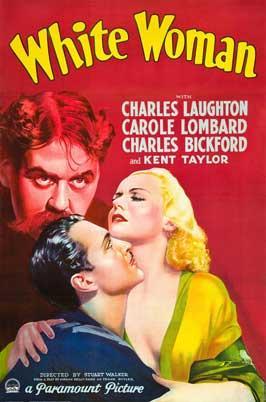by Daniel White
"A white woman, inviting insult by singing in a native cafe, you're a menace to the decent women," Carole Lombard is tersely informed by the local Anglo bigwig (Claude King) in Paramount's 1933 White Woman.
80 years ago, Hollywood lost one of its most spirited stars when Carole Lombard's plane crashed into the side of that Nevada mountain. To acknowledge the vivacious lady and her considerable contribution to the films from the Golden Age of Hollywood, I watched this heated melodrama.
In it, she plays the titular heroine, Judith Denning, a disenchanted, done-it-all kind of dame, earning her keep by singing torch songs in a saloon. And yes, she is warbling for a "mixed" crowd. The very first scene shows a turbaned, swarthy gentleman leering at Lombard while she wearily croons a bluesy dirge (she is craftily dubbed by Mona Lowe). Scandalous! A Caucasian chanteuse stirring up the local "heathens."
Dated, xenophobic, and slightly preposterous. If the idea of Carole Lombard traipsing around a South Asian island bedecked in fabulous outfits doesn't excite you, STAY AWAY. This is hothouse camp with a surprisingly fairly decent story.
Charles Laughton shows up as Horace Prin, a Cockney plantation owner who is as comic as he is unethical ("You been trading the natives rotten rice and bad gin!"). Laughton is awesome, a talented ham who chews the scenery, spits it out and gleefully asks for more. His excessive, engorged performance complements Lombard's low-key embodiment of weltschmerz perfectly.
The movie is a potboiler and while the director, Stuart Walker, is a hack, the orchids and rice patties story and the two legendary leads are supported by a crackerjack team of engaging players.
Laughton marries Lombard and takes her to his home, a houseboat on a river in the jungle. There she stirs up the red-blooded men, getting their heart's pounding. Percy Kilbride arranges flowers for her, Kent Taylor takes her on moonlit canoe rides, and Charles Bickford tries to rape her. From the subtle to the savage, Carole Lombard is such a sexy broad, she drives the boys bonkers.
Disgusted by Laughton's louche ways, she takes up with Taylor, a deserter from the army, still haunted by the decapitation death of his pal (he gets the best unintentional laugh when he says, "I've been running away from that head"!). Together they plot to leave, but of course there are complications.
In the end, Laughton and Bickford are trapped on the houseboat, playing poker, waiting for the hostile locals to attack. In a truly shocking scene, Bickford gets a dart from a blowpipe in the neck and dies. With a ghastly grin on his face, the camera lingers, something that would not be permitted when the Production Code was enforced a year later.
Lombard would finally achieve superstardom a year later in Howard Hawks' Twentieth Century, becoming Hollywood's premiere screwball comedienne. But before she found the format that fit her unique comic brilliance, she made close to forty films, this being one of them.
With Ethel Griffies, Marc Lawrence, Victor Wong, and Noble Johnson, White Woman is available on YouTube in a copy that is mediocre at best.

No comments:
Post a Comment